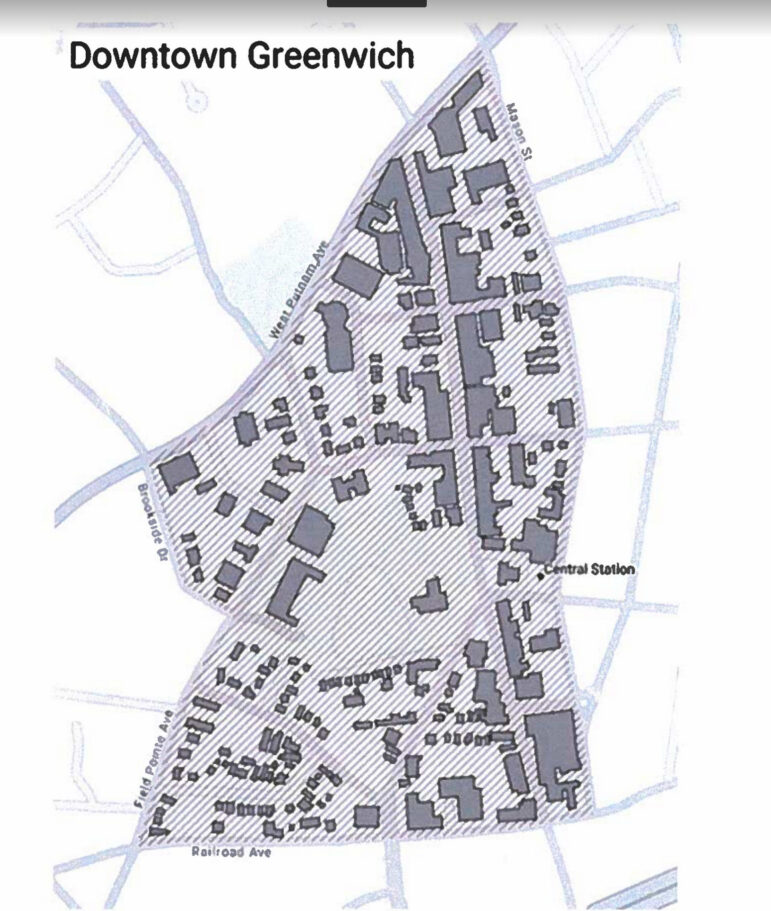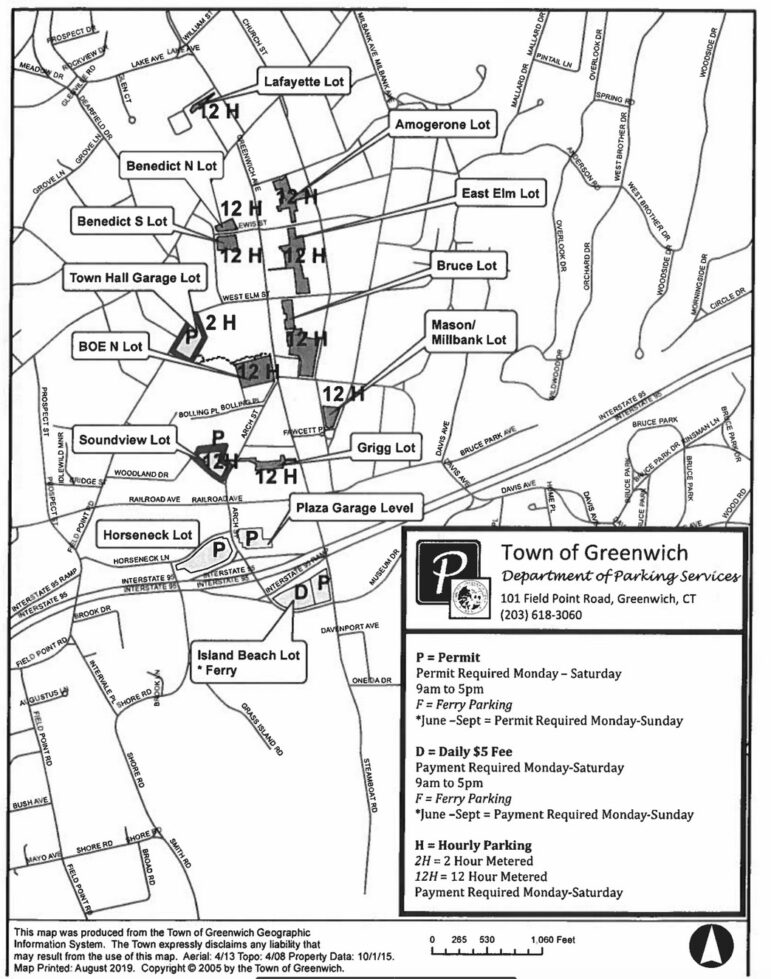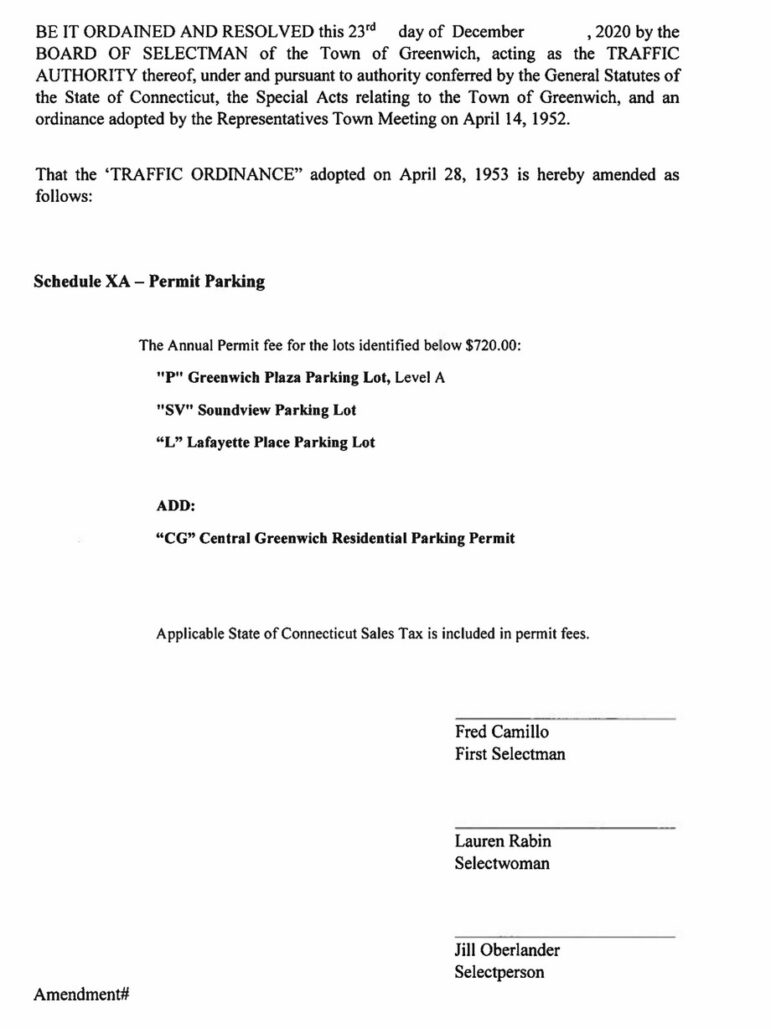At Thursday’s Board of Selectmen meeting Deputy Police Chief Mark Marino proposed a “first look” at a Central Greenwich Residential Parking Permit program that would provide some relief to people who reside in downtown and constantly feed parking meters.
These permits are not to be confused with the stickers that allow residents to park on the residential side streets.
These would be permits for residents who live within the downtown business district. The annual passes would be valid in any of the town’s eight 12-hour parking lots in central Greenwich. (See map)
The program would offer 100 permits, by lottery if there are more than 100 applicants, similar to the lottery the town holds for merchant permits to use the Lafayette Place Parking Lot.
First Selectman Camillo said the proposal addresses one of two parking issues, the other being Greenwich Avenue employees using and feeding metered spaces.
Marino said Parking Services held a lottery after receiving 24 applications for 20 spaces for the lot at Lafayette.
“I would like to do that again in some of the other parking lots in downtown. It’s a merchant program for people who work in the downtown district,” he said. “That’s something I hope to bring before the board early next year.”
The permits would cost $720 a year, which is less than a year of meter fees (someone feeding 2-hour meters six days a week from 9-5), but in line with the fee for Greenwich Plaza parking garage, Sound View lot and the Lafayette lot on Lafayette Place.
Marino said the proposal, developed by Parking Services staff, was in response to comments and concerns from downtown residents who have been spending more time at home during the pandemic.
“There’s been a change in the parking trend that we’ve noticed. With people working from home and not driving their cars as often as they normally would,” Marino said.
The idea is to offer an alternative for these residents who rely on parking meters. At the same time the Town would further a longstanding goal of diverting long term parkers from the short-term (2 hour) spaces.
The lottery would be annual, so if a resident might win the ability to purchase a $720 permit one year but not the next.
To be eligible, a downtown resident must reside within the boundaries of the Greenwich downtown district. (See map.)
Residents who apply will be required to provide two proofs of residency.
Marino said he did not anticipate an influx of new parkers, but rather be attractive to people who already park in the area.
He noted that the permit would not guarantee a parking space, just as with the commuter parking lots.
Select person Jill Oberlander asked whether the permits would be transferable, say, for example, if a downtown family within the boundaries of the downtown district has multiple drivers and cars.
“No,” Marino said.
Oberlander asked if a certain section of the lot would be set aside, whether the lots are required to be vacated at the end of the day, whether a resident would a permit could garage their car there 24/7. She also asked ow the permit program engages with Planning & Zoning’s process that considers parking as context for applications.
She asked for a holistic understanding of all the downtown parking issues.
As for enforcement, Marino said there is regular enforcement in response to complaints about people parking int he two-hour spaces all day.
He said the applications would not be one per household. Every driver in a household would be eligible to apply for one. The permit would be a hang tag, which is the most readily visible, but maybe a sticker might prevent people from trying to loan their permit to someone else.
Marino said he did not intent to designate certain sections for permit holders. Ms Oberlander asked what might happen if, say, the lot by the Havemeyer building became full with permit holders.
There is an existing 24 hour rule. Cars cannot park more than 24 hours on either public streets or municipal parking lots. Marino said enforcement is typically triggered by resident complaints.
See also:
12 Residential Units Proposed for Mothballed Space in Former Bowling Alley


